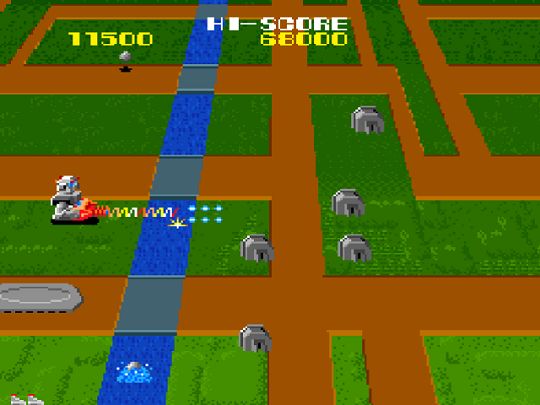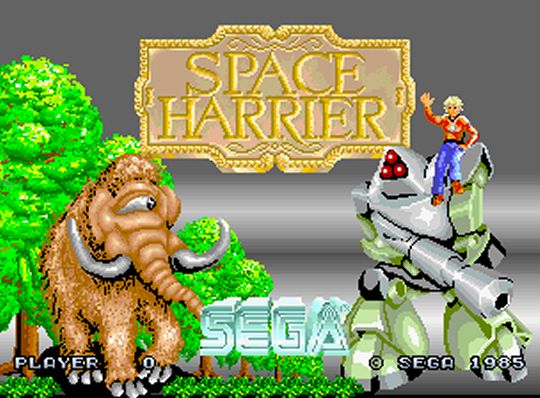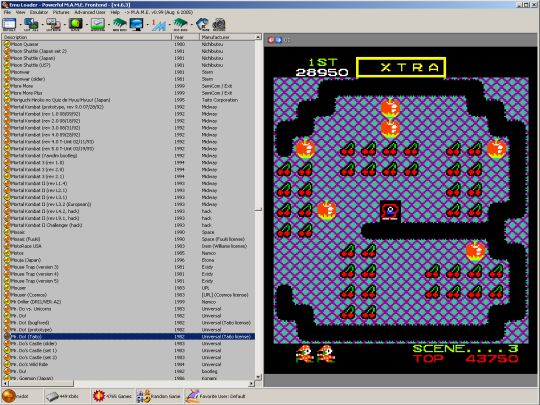|
MAME OVER
The king is dead.
"By far the greatest and most important piece of videogaming code ever written."
Those were the words, chums, of this very reporter, spoken about the Multiple Arcade Machine Emulator (or MAME to its friends) when interviewed by formerly-interesting videogames magazine Edge about it all the way back in October 2002. Created in early 1997, MAME rose from humble beginnings as a Pac-Man emulator created by teenage Italian coder Nicola Salmoria, and immediately started to grow at an exponential rate. Within a few short months the number of games it ran had eclipsed the previous gold standard in arcade emulation, Dave Spicer's Sparcade, and MAME streaked off into the distance without a backwards glance. At the time of writing, the emulator supports well over 5,000 different ROM sets, and over 3,000 distinct games - a very substantial proportion of the entire history of arcade gaming.
It's a little bit surprising, then (to him, certainly), that your correspondent will never be downloading another update of MAME again.

MAME doing what it used to do - rescuing great arcade games from obscurity.
To understand why, we need a little historical background. A few months into MAME's development, Nicola Salmoria had to go off and do his Italian National Service, which naturally put something of a dampener on his opportunities for emulator coding. The helm of the project was taken over by another Italian coder, Mirko Buffoni, in April 1997, under whose guidance MAME ran for several years, growing in size from a few dozen games to hundreds and eventually into four figures. Around this point, the emulator reached the peak of its popularity - millions of people watched sites like Retrogames obsessively for new releases, speculating wildly over which new games might be included (there was no work-in-progress news in those days, and releases arrived out of the blue, met by ecstatic frenzies of excitement), and the program was plastered all over the gaming media, both print and online.
And then it all started to go wrong.
By now, MAME had become far too big for one person to run single-handed, and steadily more people became closely involved at the heart of the project. Eventually, the maintainers coalesced into an official body, known as MAMEDEV, and slowly but surely things started to be done differently. The emulator's nominal purpose had always been to serve as a historical document of coin-op games, rather than as a means by which people could actually play and enjoy them, but under the new management this aim became more and more rigidly adhered to. (No longer, for example, would the "What's new?" text file accompanying each release start off by proudly listing all the new games for which support had been added or improved, but rather reams of tedious technical documentation detailing incomprehensible changes to the source code, with new games being vaguely alluded to somewhere later on, if users were lucky.) In essence, MAME had been hijacked.

The kind of "realism" that doesn't suck.
"Hijacked? By being devoted more closely to its original stated purpose? That's a bit of a stretch, isn't it?", some of WoS' huffier readers might be pouting at this point. But a hijack it was. Because MAME's official mission statement had always had a knowing wink behind it. Everybody knew that the real purpose of the emulator was to share these great, largely-lost old games again, in the only meaningful way there was - by playing them. But from the birth of MAMEDEV, users effectively ceased to exist. Technical considerations were now the only considerations that mattered. If a potential change to the program would result in a fractional increase in theoretical accuracy, at the cost of a huge loss of functionality, then it was made.
By way of a minor illustration, a number of years ago an alteration was made to the way that sound was implemented in Asteroids. Previously, the emulator had used samples, rather than strictly emulating the machine's sound output, but the result was that MAME Asteroids looked, sounded and played like coin-op Asteroids. But the developers decided that this was "inaccurate", and instead introduced a crude early version of emulated sound, forcibly disabling the samples at the same time.
The result was that the game now sounded nothing at all like coin-op Asteroids, but was, in an abstract technical sense, more accurate. (While obviously being, in any practical and meaningful sense, much less accurate.) That was enough for the developers to implement the change in the release version - rather than, say, waiting until the emulated sound was at least as good as the samples - and instantly ruin the enjoyment of Asteroids for MAME's millions of users. Compared to the miseries that would later be inflicted on those users it was a trivial incident (and after being broken for many months and releases, the emulated sound eventually matched the samples), but the incident served as a striking illustration of the developers' skewed and twisted new sense of priorities.

Space Harrier - one of many great games rendered unplayable in MAME by "accuracy".
Another aspect in which functionality was discarded as an aim was the concentration of the new administrators on pointlessly "emulating" arcade machines which were hugely beyond the abilities of MAME's rather sluggish core code. Designed to cope with games like Donkey Kong, Galaxian and Dig Dug, MAME was never the quickest of emulators, and had long been effortlessly outpaced on more complex games by other multi-game emus like Zinc and Final Burn, never mind dedicated high-level apps like the Ridge Racer emulator Viva Nonno. But present-era MAME is continually forced into embarrassing attempts at running 3D polygon games like San Francisco Rush, in which it struggles to achieve completely unplayable frame rates of 5 or 6 fps even on high-powered PCs.
(Of course, it's nice to know that these games are supported, or rather will be in about five years' time when PCs are fast enough to run them halfway-properly, but it's an odd thing to devote your time to now. Especially since most of the titles concerned have arcade-perfect console ports anyway, unlike the lost-to-posterity games from the early days of arcades that drew so many people to MAME in the first place and gave its existence some kind of point other than pure piracy.)
The most disturbing aspect of the new regime, though, was the open contempt in which MAME's users were now evidently held. Major upheavals in the game's interface went undocumented, and requests for information rudely refused. Anyone who wasn't capable of interpreting the source code themselves, it appeared, was no longer welcome to use the emulator. "Remember," ran several condescending responses on the official forum, "MAME is a historical artefact, not a games machine."

Your reporter, all in blue, paying a visit to the headquarters of MAMEDEV.
Another instructive example of the attitude of the emulator's current developers appeared very recently over on the official MAME messageboard. The small add-on file "hiscore.dat" is one of the core factors in MAME's appeal. By a simple method, it adds a highscore-saving facility to games which lacked it in the arcade (ie those ones where the highscores you'd just spent three gruelling hours of battle achieving were lost forever every time the machine's power was switched off).
Highscore saving was one of the greatest single boosts to MAME's functionality and popularity. It transforms the simple old coin-ops from essentially pointless exercises in repetition into something where you always have a target to aim for, adding long-term appeal to the short-term buzz of the five minutes you spend playing the game. You need only pay a visit to console gaming forums when a new "retro" release has come out to see the fury of fans if the publisher has been too cheap or stupid to include a highscore memory-save facility. And yet, the leading members of the MAMEDEV team are as keen as mustard to throw out this wonderful, long-implemented functionality - rather than making it optional, even - for no other reason than that it's "not accurate".
What we're dealing with here, chums, are nerds. Nerds have already ruined mainstream videogaming, snatching defeat from the jaws of victory around the middle of the PS1 era and lumbering the rest of us with a crushing weight of dull, plodding, endless fantasy RPGs or dry, joyless sports sims, which the occasional fun, entertaining game must exhaust itself trying to crawl out from under. Now, in a tragedy whose dimensions shouldn't be underestimated, they've put a stranglehold on the once-thriving world of emulation.
(Heck, these days, nobody even bothers to put out the new and changed ROMs for each new release of MAME up on Usenet. If you find that half your ROMs suddenly don't work with a new release - and you will, because there's nothing the current developers like more than changing perfectly-working ROMsets so that games that have run happily for seven years suddenly find themselves requiring a new 14-byte file that has no palpable effect on anything - chances are there won't be anywhere you can locate the new ones.)

Your reporter's favourite MAME frontend for six years, destroyed for no good reason.
MAME has become the emulator equivalent of Windows - bloated, slow and unloved, but so overwhelmingly colossal that nothing else can hope to make a dent in its all-encompassing, suffocating monopoly. All the joy and love that used to characterise it are being sucked out piece by piece, by the sort of people who would try to "preserve" a butterfly by sticking a pin through its heart and sticking it in a glass display cabinet, where people could look at its corpse, but not watch it live and fly and do what butterflies were made to do.
This reporter's had enough. The latest release of MAME features a spectacularly un-necessary overhauling of the configuration system, the end result of which is that every last option and control setup for over 3,000 games, painstakingly built up over six years of using one interface, must be thrown away and recreated from scratch. (And that without the benefit of even the merest scrap of information as to how the new system actually works. Mind you, it can't be long before the whole idea of configurable controls is thrown out as well - after all, you can't reconfigure coin-op controllers, can you? That's not "accurate", is it? Get rid of it!)
It's the last straw for your emulation-loving correspondent, viewers. MAME 0.99 is the last one which will ever be installed on this reporter's PC, or talked or written about. Another figure will be added to the long lines of those shuffling away from the once-great emulator with sad looks on their faces, fondly recalling better days when new releases added functionality rather than removing it, and when new titles were supported that were actually games rather than solely being pieces of abstract technical showing-off by the developers that won't be playable for a decade (playable support for a fun new game is something that hasn't featured in a MAME release for months).
Perhaps eventually, the MAMEDEV team will achieve their goal and finally remove the last remaining shreds of user functionality, leaving them alone and happy in their exclusive ability to actually comprehend and operate the program. And then, at least, the rest of us will know that no more harm will be done to the abused and broken emulator that we used to love.
Death to nerds.
|

